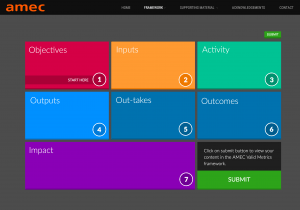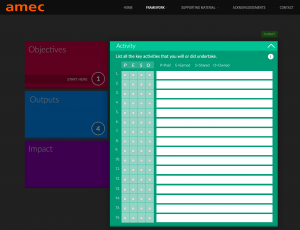
So I was excited to see the new Valid Metrics Framework that was launched at the receive International Summit on Measurement. The AMEC members are all in the PR industry, so it wasn’t surprising that the first press releases trumpeted the enthusiasm and endorsement that the new tool has received. But what is it, and how good is the new AMEC PR measurement framework?
The Theory of the AMEC PR Measurement Framework
It’s good to see that the tool is based upon a simple model of PR (which extends the model used in the VMM). The new tool uses six stages:
- Objectives – what the organisation wants to achieve
- Inputs – target audience and strategy
- Activity – the key things to be done in the campaign
- Outputs – what the campaign produces
- Out-takes – how the audience reacts to the campaign
- Outcomes – the effect of the campaign on the target audience
- Impact – the effect of the campaign on the organisation’s business
These stages are those found in the research: The Kellogg Foundation program logic model (Kellogg Foundation, 1998/2004) and the University of Wisconsin Extension (UWEX) program logic model (Taylor-Power & Henert, 2008).
The AMEC Online Tool

Using the Valid Metrics Framework
The Framework combines all the inputs onto a single page, with a layout that follows the natural flow of the model. And this is where we’re a little disappointed. It’s true a lot of people had problems getting their head around the VMM, and in my opinion most of the value of this matrix was in the way it sparked discussions around the objectives, activities and metrics. The new Valid Metrics Framework is different. For sure, it’s easier to use and understand. it’s also applicable across a wider variety of campaigns. The “but”, however, is that it feels more like an exercise in generating lists of things, rather than a holistic tool that sparks discussion. It’s still early days, so maybe I’ll change my mind and decide that the new process is a better way of thinking about measurement, but I’m not throwing away all my copies of the VMM just yet!
Author
-
In 2001 Mike acquired Napier with Suzy Kenyon. Since that time he has directed major PR and marketing programmes for a wide range of technology clients. He is actively involved in developing the PR and marketing industries, and is Chair of the PRCA B2B Group, and lectures in PR at Southampton Solent University. Mike offers a unique blend of technical and marketing expertise, and was awarded a Masters Degree in Electronic and Electrical Engineering from the University of Surrey and an MBA from Kingston University.
View all posts
